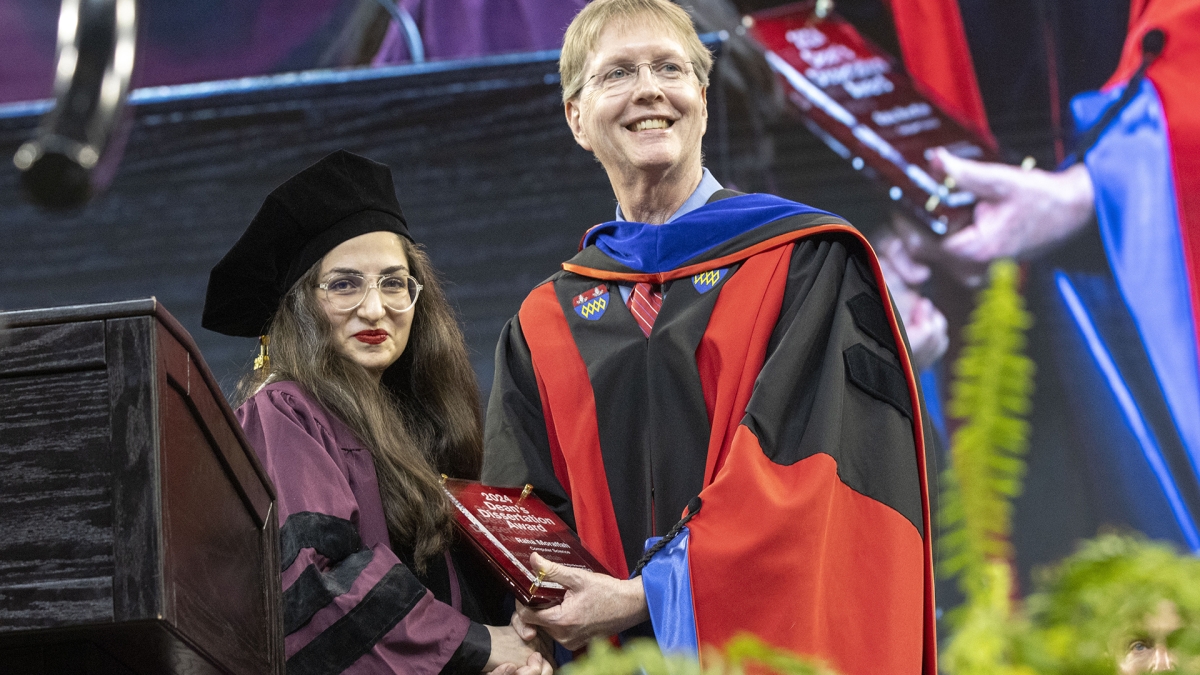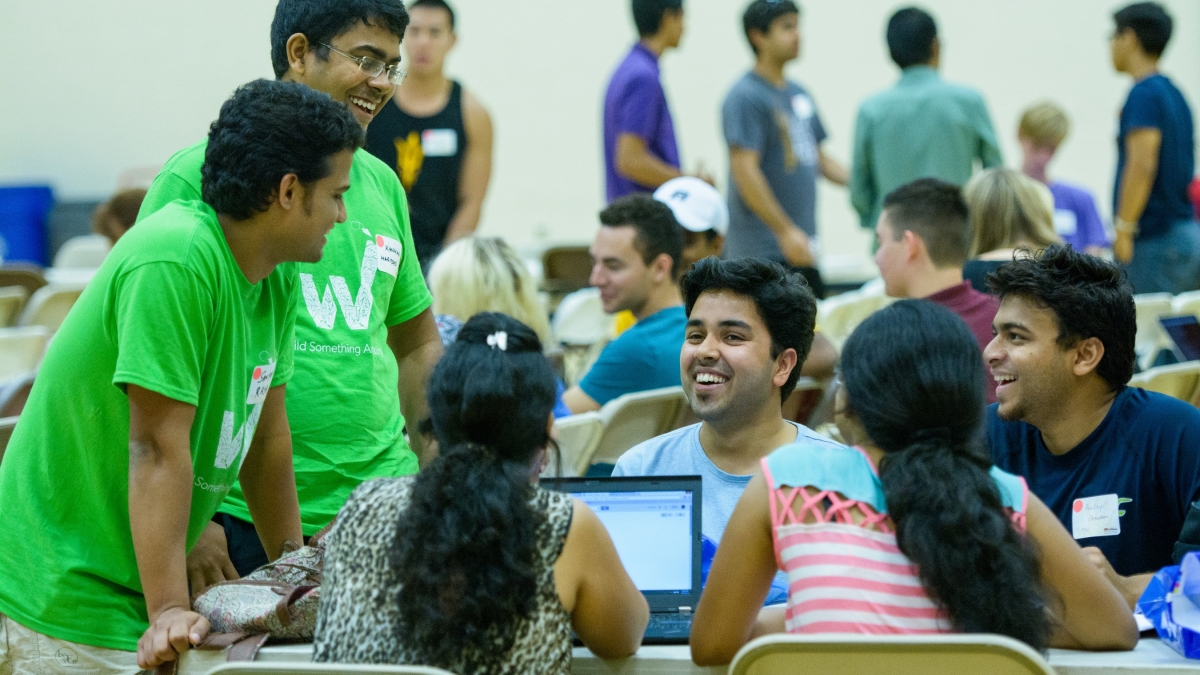Hacking can imply something negative: your identity stolen, your bank account emptied. Can it go the other way?
An Arizona State University initiative that aims to create technologies for the social good proves it can.
Hacks for Humanity, now an annual signature event sponsored by ASU’s award-winning Project Humanities, is a 36-hour entrepreneurial marathon in which participants are challenged to create technical solutions and initiatives to address local and global issues. This weekend's event, which is open to the public, starts at 8 a.m. Saturday and ends late afternoon Sunday at Stauffer B Building on the ASU Tempe campus.
Participants are asked to implement the seven principles that Project Humanities identifies as Humanity 101: kindness, compassion, integrity, respect, empathy, forgiveness and self-reflection. This year, the hackathon has added three new tracks to guide this year’s participants: education, health care and Earth, according to the event's sponsor.
“With such a range of possible directions, we expect that products will connect with many issues relevant to our current political and social climate locally, nationally and globally,” said Neal A. Lester, professor of English and director of Project Humanities. "We are so excited to have a wider network of supporters, sponsors and participants registered for this year’s event. We know that this year’s event will be as robustly transformative for participants in years past."
The hackathon provides participants with the skills and resources they need to succeed as social entrepreneurs, something that Jack Selby knows a little something about. The venture capitalist and former vice president of PayPal recently cut a trip short to the Middle East to co-headline a panel discussion at the hackathon called “Brainstorming and Idea Development — Value Proposition.”
“Project Humanities is so timely given today’s public discourse. So much talking past each other, too much rhetoric and not enough listening and respect for difference and non-conformity,” Selby said. “This applies to both ends of every spectrum, and we all need to step back and assess where we are as a society today. The spirit of Project Humanities seeks to level-set this dialogue and hopefully bring everyone to the table for open and honest thought and discussion.”
Selby won’t be the only heavy-hitter on hand at this year’s hackathon. Other guests include Michelle M. Mace, Jim Tuton and Adam Draizen, successful entrepreneursASU alumna Mace, a national consumer segmentation specialist, is founder and owner of M3B, a boutique strategic marketing consultancy based in Phoenix. Serial entrepreneur Jim Tuton has launched and operated several successful businesses in the past 30 years including American Traffic Solutions, which provides road safety technology, electronic toll collection systems, payment processing and traffic enforcement management solutions. Draizin served in a variety of roles at American Traffic Solutions and has worked in business strategy consulting for a number of global businesses. who have either launched, marketed or operated businesses as well as pioneering technology that has impacted lives.
In addition to the panels and presentations, the hackathon will include sponsored workshopsThis year's workshops are sponsored by State Farm, Amazon and ASU Entrepreneurship + Innovation., team-building exercises, games and activities, silent disco, yoga class and an awards ceremony.
For the past three years, the hackathons have brought together creatives from all walks of life. So far, more than 230 people have registered, and 21 mentors and volunteers will be on hand to help.
“The idea is to encourage other people to innovate and use technology to keep humanity at the forefront of their thoughts,” Mace said. “Entrepreneurs must be conscious not to create a problem when they are creating a solution.”
Lester said the excitement and momentum of the event builds each year because participants' efforts have relevance and potential for immediate impact. The hackathon has inspired technologies such as:
• a coping app that helps children with ADHD communicate with their parents
• an app that prevents parents from leaving children in their hot cars
• a game-based app that provides adaptive learning technologies for students with disabilities
• an app that sends daily reminders to perform random acts of kindness
One of the most notable innovations to come out of Hacks for Humanity is ARKHumanity’s application that scans tweets for keywords that could indicate suicidal thoughts — for example, “I want to die,” “I’m going to kill myself,” or “I hate my life” and other similar phrases. A crisis counselor can then reach out to the person and offer help. This inaugural Hacks for Humanity team has gone on to win multiple entrepreneurship competitions and form its own for-profit, Humanity X.
Community members, both with or without development experience, are invited to attend. Participants will then form small teams that include developers, designers and visionaries. At the end of the 36 hours, groups will present their newly created mobile app to a team of experts selected just for this event. Sponsor prizes will be presented to winning teams.
For more information or to register for Hacks for Humanity, visit http://www.hacksforhumanity.io.
Top photo: 2016 ASU hackathon participants working on a new app. Photo courtesy of Project Humanities
More Science and technology
Extreme HGTV: Students to learn how to design habitats for living, working in space
Architecture students at Arizona State University already learn how to design spaces for many kinds of environments, and now they can tackle one of the biggest habitat challenges — space architecture…

Human brains teach AI new skills
Artificial intelligence, or AI, is rapidly advancing, but it hasn’t yet outpaced human intelligence. Our brains’ capacity for adaptability and imagination has allowed us to overcome challenges and…

Doctoral students cruise into roles as computer engineering innovators
Raha Moraffah is grateful for her experiences as a doctoral student in the School of Computing and Augmented Intelligence, part of the Ira A. Fulton Schools of Engineering at Arizona State University…
